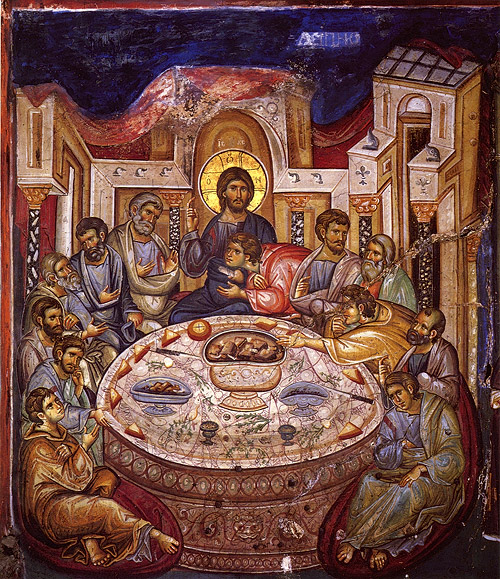В день опресноков, когда по ветхозаветному закону должно было заклать и вкушать пасхального агнца, и когда прииде час, да прейдет Спаситель от мира сего к Отцу (Ин. 13, 1), Иисус Христос, пришедший исполнить закон, послал Своих учеников – Петра и Иоанна в Иерусалим приготовить Пасху, которую, как сень законную, хотел Он заменить Пасхою новою, – самим телом и кровью Своею. По наступлении вечера Господь пришел с двенадцатью Своими учениками в большую, устланную, готовую горницу одного Иерусалимлянина (Мк. 14, 12–17) и возлег. Внушая, что в Царстве Божием, которое не от мира сего, не земное величие и слава, но любовь, смирение и чистота духа отличают истинных членов, Господь, возстав от вечери, умыл ноги своим ученикам. Умыв ноги и возлегши опять, Господь сказал ученикам: знаете ли, что Я сделал вам? Вы называете Меня Учителем и Господом, и правильно говорите, ибо Я точно то. Итак, если Я, Господь и Учитель, умыл ноги вам, то и вы должны умывать ноги друг другу. Ибо Я дал вам пример, чтобы и вы делали то же, что Я сделал вам.
По умовении ног Иисус Христос совершил Пасху сначала по закону Моисееву, потом установил и Пасху новую – великое таинство святейшей Евхаристии. Установление таинства святого причащения есть второе событие, которое Православная Церковь воспоминает в Великий четверток.
Таинство святого причащения, установленное Господом пред Его страданиями и смертью, по заповеди Иисуса Христа: сие творите в Мое воспоминание, с первых времен до настоящих непрерывно совершается на многочисленных престолах Церкви Вселенской.
На вечери Господь определительно предрек ученикам, что один из них предаст Его, и это именно тот, кому Господь подаст кусок хлеба, обмакнув в солило, и обмакнув, подал Иуде Искариотскому. По хлебу вошел в него сатана; и предатель тотчас удалился от Христа и Церкви Его. Была уже ночь (Ин. 13, 1–30). Прекратив спор Апостолов о первенстве, которое между ними должно состоять не в господстве и обладании, но кто из вас больше, будь как меньший, и начальствующий – как служащий, и предсказав Апостолам общее искушение, а Петру троекратное отречение от Христа и Свое явление им по воскресении в Галилее, Господь вошел с ними в сад Гефсиманский, – на гору Елеонскую (Лк. 22, 24–28; Мф. 26, 30–35). Здесь начались Его страдания: сначала душевные, а потом и телесные. Предначиная Свои страдания, Господь сказал ученикам: посидите тут, пока Я пойду, помолюсь там, и взяв с Собою Петра, Иакова и Иоанна, бывших свидетелями славы Его во время преображения, начал скорбеть и тосковать. Душа Моя скорбит смертельно; побудьте здесь и бодрствуйте со Мною, сказал ученикам Своим Богочеловек. Отойдя от них на вержение камня, Он преклонил главу и колена, и молился до кровавого пота, как человек, чувствуя чашу страданий, и совершенно предаваясь воле Отца. Иисусу Христу явился Ангел с небес и укреплял Его. Во время молитвы Своей Господь троекратно подходил к Ученикам Своим и говорил им: бодрствуйте и молитесь, чтобы не впасть в искушение: дух бодр, плоть же немощна. Но ученики не могли молитвенно бдеть с Господом, ибо у них глаза отяжелели.
Гефсиманская молитва Иисуса Христа наставляет нас, что среди искушений и скорбей молитва подает нам высокое и святое утешение и укрепляет готовность встретить и перенести страдания и смерть. Могущество молитвы, утешающей и укрепляющей, Господь поучительно показал и Своим примером пред Своими страданиями и смертью, и в то же время внушениями скорбевшим Апостолам: бодрствуйте и молитесь, чтобы не впасть в искушение: дух бодр, плоть же немощна.
Около полуночи приходит в сад предатель с множеством вооруженного народа, присланного от первосвященников и старейшин. Господь Сам идет к ним на встречу и словами: Это Я, коими Он давал им знать о Себе, повергает их на землю и потом смиренно допускает предателя поцеловать и взять Себя на страдания и смерть (Мф. 26, 36–56; Мк. 14, 32–46; Лк. 12, 38–53). Так Господь, являвший продолжение земной Своей жизни Божественное всемогущество и власть над законом естества, словом: Это Я повергший на землю предателя с народом, имевший во власти Своей легионы Ангелов, но пришедший принести Себя в жертву за грехи мира, добровольно и смиренно предает Самого Себя в руки грешников!
По традиции все верующие в этот день причащаются Святых Христовых Тайн.
Протоиерей Г.С. Дебольский,
«Дни Богослужения Православной Церкви», т.2
По умовении ног Иисус Христос совершил Пасху сначала по закону Моисееву, потом установил и Пасху новую – великое таинство святейшей Евхаристии. Установление таинства святого причащения есть второе событие, которое Православная Церковь воспоминает в Великий четверток.
Таинство святого причащения, установленное Господом пред Его страданиями и смертью, по заповеди Иисуса Христа: сие творите в Мое воспоминание, с первых времен до настоящих непрерывно совершается на многочисленных престолах Церкви Вселенской.
На вечери Господь определительно предрек ученикам, что один из них предаст Его, и это именно тот, кому Господь подаст кусок хлеба, обмакнув в солило, и обмакнув, подал Иуде Искариотскому. По хлебу вошел в него сатана; и предатель тотчас удалился от Христа и Церкви Его. Была уже ночь (Ин. 13, 1–30). Прекратив спор Апостолов о первенстве, которое между ними должно состоять не в господстве и обладании, но кто из вас больше, будь как меньший, и начальствующий – как служащий, и предсказав Апостолам общее искушение, а Петру троекратное отречение от Христа и Свое явление им по воскресении в Галилее, Господь вошел с ними в сад Гефсиманский, – на гору Елеонскую (Лк. 22, 24–28; Мф. 26, 30–35). Здесь начались Его страдания: сначала душевные, а потом и телесные. Предначиная Свои страдания, Господь сказал ученикам: посидите тут, пока Я пойду, помолюсь там, и взяв с Собою Петра, Иакова и Иоанна, бывших свидетелями славы Его во время преображения, начал скорбеть и тосковать. Душа Моя скорбит смертельно; побудьте здесь и бодрствуйте со Мною, сказал ученикам Своим Богочеловек. Отойдя от них на вержение камня, Он преклонил главу и колена, и молился до кровавого пота, как человек, чувствуя чашу страданий, и совершенно предаваясь воле Отца. Иисусу Христу явился Ангел с небес и укреплял Его. Во время молитвы Своей Господь троекратно подходил к Ученикам Своим и говорил им: бодрствуйте и молитесь, чтобы не впасть в искушение: дух бодр, плоть же немощна. Но ученики не могли молитвенно бдеть с Господом, ибо у них глаза отяжелели.
Гефсиманская молитва Иисуса Христа наставляет нас, что среди искушений и скорбей молитва подает нам высокое и святое утешение и укрепляет готовность встретить и перенести страдания и смерть. Могущество молитвы, утешающей и укрепляющей, Господь поучительно показал и Своим примером пред Своими страданиями и смертью, и в то же время внушениями скорбевшим Апостолам: бодрствуйте и молитесь, чтобы не впасть в искушение: дух бодр, плоть же немощна.
Около полуночи приходит в сад предатель с множеством вооруженного народа, присланного от первосвященников и старейшин. Господь Сам идет к ним на встречу и словами: Это Я, коими Он давал им знать о Себе, повергает их на землю и потом смиренно допускает предателя поцеловать и взять Себя на страдания и смерть (Мф. 26, 36–56; Мк. 14, 32–46; Лк. 12, 38–53). Так Господь, являвший продолжение земной Своей жизни Божественное всемогущество и власть над законом естества, словом: Это Я повергший на землю предателя с народом, имевший во власти Своей легионы Ангелов, но пришедший принести Себя в жертву за грехи мира, добровольно и смиренно предает Самого Себя в руки грешников!
По традиции все верующие в этот день причащаются Святых Христовых Тайн.
Протоиерей Г.С. Дебольский,
«Дни Богослужения Православной Церкви», т.2
On the day of unleavened bread, when, according to the Old Testament law, it was necessary to slay and partake of the Passover lamb, and when the hour came, let the Savior pass from this world to the Father (John 13, 1), Jesus Christ, who came to fulfill the law, sent His disciples - Peter and John to Jerusalem to prepare Easter, which, like a legal canopy, He wanted to replace Easter with a new one - with His very body and blood. At evening, the Lord came with His twelve disciples to the large, strewn, ready room of a Jerusalem Jerusalem man (Mark 14, 12-17) and rested. Suggesting that in the Kingdom of God, which is not of this world, not earthly greatness and glory, but love, humility and purity of spirit distinguish true members, the Lord, having risen from the supper, washed the feet of his disciples. After washing his feet and laying down again, the Lord said to his disciples: Do you know what I have done to you? You call Me Teacher and Lord, and speak correctly, for I am exactly that. So, if I, the Lord and Teacher, washed your feet, then you must wash each other's feet. For I have set an example for you, so that you do what I did to you.
According to the washing of the feet, Jesus Christ made Easter first according to the law of Moses, then he also established a new Easter - the great sacrament of the Most Holy Eucharist. The establishment of the sacrament of holy communion is the second event that the Orthodox Church recalls in the Great Four.
The sacrament of holy communion, established by the Lord before His sufferings and death, according to the commandment of Jesus Christ: do this in My memory, from the first times to the present it is continuously performed on the many thrones of the Universal Church.
In the evening, the Lord definitely predicted to the disciples that one of them would betray Him, and this is exactly the one to whom the Lord will serve a piece of bread, dipped in a solo, and dipped, gave it to Judas Iscariot. Satan came into it by bread; and the traitor immediately departed from Christ and his church. It was already night (John 13, 1-30). Stopping the dispute of the Apostles about primacy, which between them should not consist in domination and possession, but which of you is greater, be as less, and the ruling one as a servant, and predicting to the Apostles a general temptation, and Peter threefold renunciation of Christ and His manifestation according to them Resurrection in Galilee, the Lord entered with them into the garden of Gethsemane, - on the Mount of Olives (Luke 22, 24–28; Matthew 26, 30–35). Here began His sufferings: first spiritual, and then physical. Foretelling His sufferings, the Lord told the disciples: Sit here while I go, pray there, and taking with me Peter, James, and John, who witnessed His glory during the transfiguration, began to grieve and yearn. My soul mourns mortally; stay here and watch with Me, said the God-man to His disciples. Moving away from them to cast a stone, He bowed his head and knee, and prayed to a bloody sweat, like a man, feeling the cup of suffering, and completely surrendering to the will of the Father. An angel from heaven appeared to Jesus Christ and strengthened him. During His prayer, the Lord three times approached His Disciples and said to them: Watch and pray, so as not to fall into temptation: the spirit is alert, but the flesh is weak. But the disciples could not prayerfully watch with the Lord, for their eyes were heavy.
The Gethsemane prayer of Jesus Christ instructs us that in the midst of temptations and sorrows, prayer gives us high and holy comfort and strengthens our willingness to meet and suffer suffering and death. The Lord instructively showed the power of prayer, comforting and strengthening, both by His example before His sufferings and death, and at the same time by suggestions to the mourned Apostles: watch and pray so as not to fall into temptation: the spirit is alert, the flesh is weak.
Around midnight, a traitor comes to the garden with many armed people sent from high priests and elders. The Lord Himself comes to meet them and says: It is I, by whom He let them know about Himself, throws them to the ground and then humbly allows the traitor to kiss and take Him to suffer and die (Matthew 26, 36–56; Mark 14 , 32–46; Luke 12, 38–53). So the Lord, who manifested the continuation of His earthly life, the Divine omnipotence and power over the law of nature, with the word: It’s I who threw down a traitor to the earth with the people, who had the legion of Angels in my power, but who came to sacrifice Himself for the sins of the world, voluntarily and humbly betrays Himself into the hands of sinners!
By tradition, all believers on this day receive Communion of the Holy Mysteries of Christ.
Archpriest G.S. Debolsky,
"Days of Divine Services of the Orthodox Church", v.2
According to the washing of the feet, Jesus Christ made Easter first according to the law of Moses, then he also established a new Easter - the great sacrament of the Most Holy Eucharist. The establishment of the sacrament of holy communion is the second event that the Orthodox Church recalls in the Great Four.
The sacrament of holy communion, established by the Lord before His sufferings and death, according to the commandment of Jesus Christ: do this in My memory, from the first times to the present it is continuously performed on the many thrones of the Universal Church.
In the evening, the Lord definitely predicted to the disciples that one of them would betray Him, and this is exactly the one to whom the Lord will serve a piece of bread, dipped in a solo, and dipped, gave it to Judas Iscariot. Satan came into it by bread; and the traitor immediately departed from Christ and his church. It was already night (John 13, 1-30). Stopping the dispute of the Apostles about primacy, which between them should not consist in domination and possession, but which of you is greater, be as less, and the ruling one as a servant, and predicting to the Apostles a general temptation, and Peter threefold renunciation of Christ and His manifestation according to them Resurrection in Galilee, the Lord entered with them into the garden of Gethsemane, - on the Mount of Olives (Luke 22, 24–28; Matthew 26, 30–35). Here began His sufferings: first spiritual, and then physical. Foretelling His sufferings, the Lord told the disciples: Sit here while I go, pray there, and taking with me Peter, James, and John, who witnessed His glory during the transfiguration, began to grieve and yearn. My soul mourns mortally; stay here and watch with Me, said the God-man to His disciples. Moving away from them to cast a stone, He bowed his head and knee, and prayed to a bloody sweat, like a man, feeling the cup of suffering, and completely surrendering to the will of the Father. An angel from heaven appeared to Jesus Christ and strengthened him. During His prayer, the Lord three times approached His Disciples and said to them: Watch and pray, so as not to fall into temptation: the spirit is alert, but the flesh is weak. But the disciples could not prayerfully watch with the Lord, for their eyes were heavy.
The Gethsemane prayer of Jesus Christ instructs us that in the midst of temptations and sorrows, prayer gives us high and holy comfort and strengthens our willingness to meet and suffer suffering and death. The Lord instructively showed the power of prayer, comforting and strengthening, both by His example before His sufferings and death, and at the same time by suggestions to the mourned Apostles: watch and pray so as not to fall into temptation: the spirit is alert, the flesh is weak.
Around midnight, a traitor comes to the garden with many armed people sent from high priests and elders. The Lord Himself comes to meet them and says: It is I, by whom He let them know about Himself, throws them to the ground and then humbly allows the traitor to kiss and take Him to suffer and die (Matthew 26, 36–56; Mark 14 , 32–46; Luke 12, 38–53). So the Lord, who manifested the continuation of His earthly life, the Divine omnipotence and power over the law of nature, with the word: It’s I who threw down a traitor to the earth with the people, who had the legion of Angels in my power, but who came to sacrifice Himself for the sins of the world, voluntarily and humbly betrays Himself into the hands of sinners!
By tradition, all believers on this day receive Communion of the Holy Mysteries of Christ.
Archpriest G.S. Debolsky,
"Days of Divine Services of the Orthodox Church", v.2

У записи 11 лайков,
0 репостов,
209 просмотров.
0 репостов,
209 просмотров.
Эту запись оставил(а) на своей стене Вероника Вовденко
































